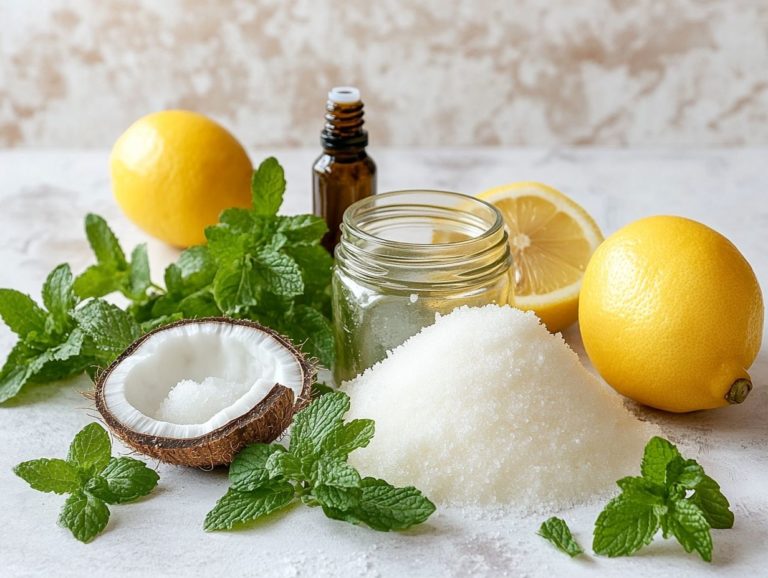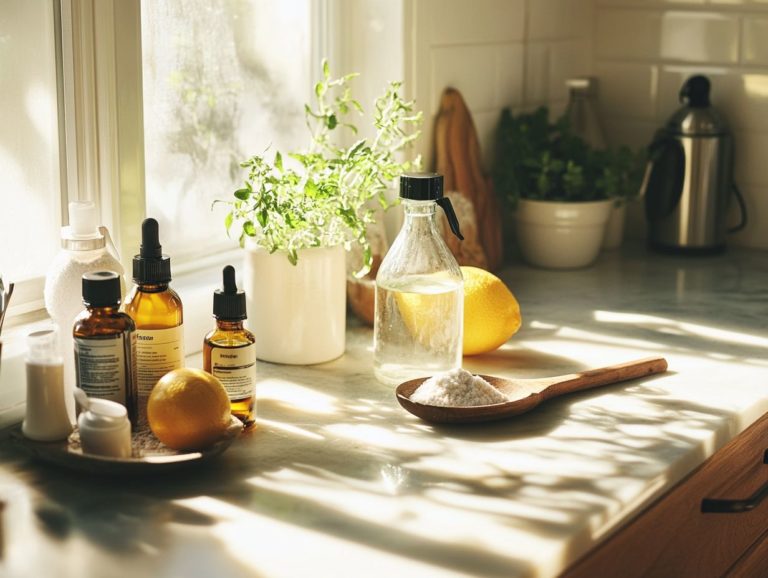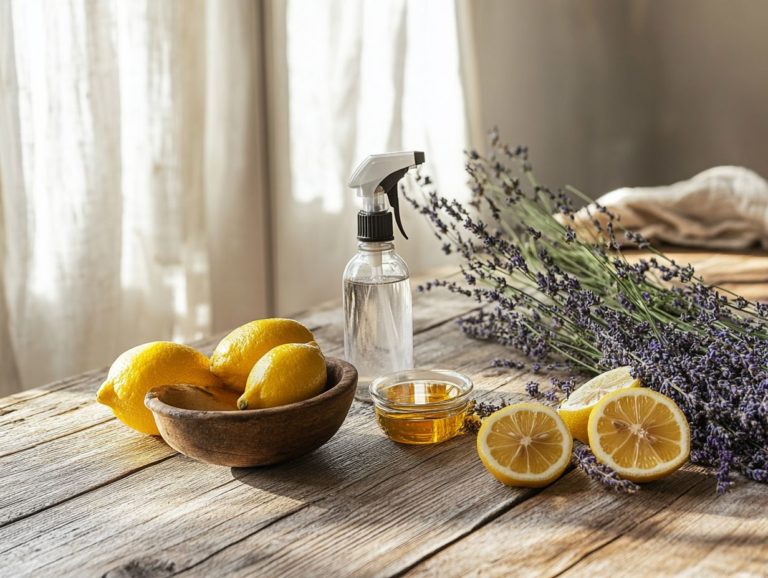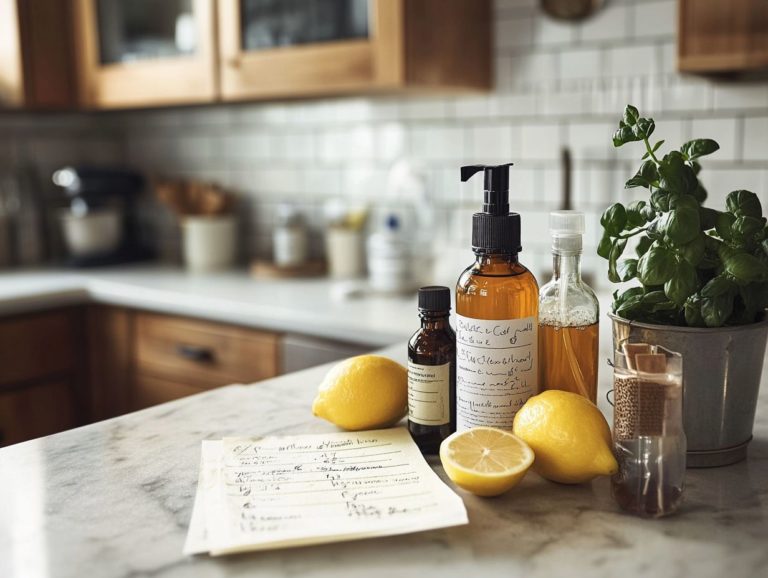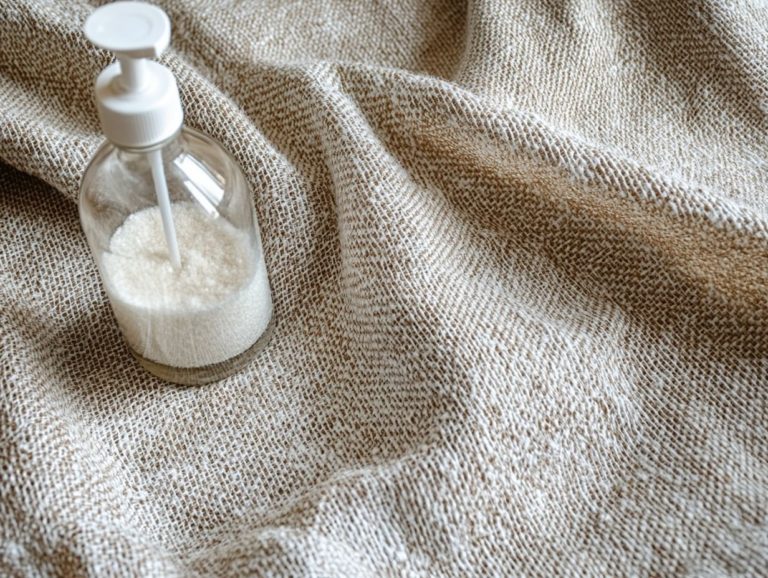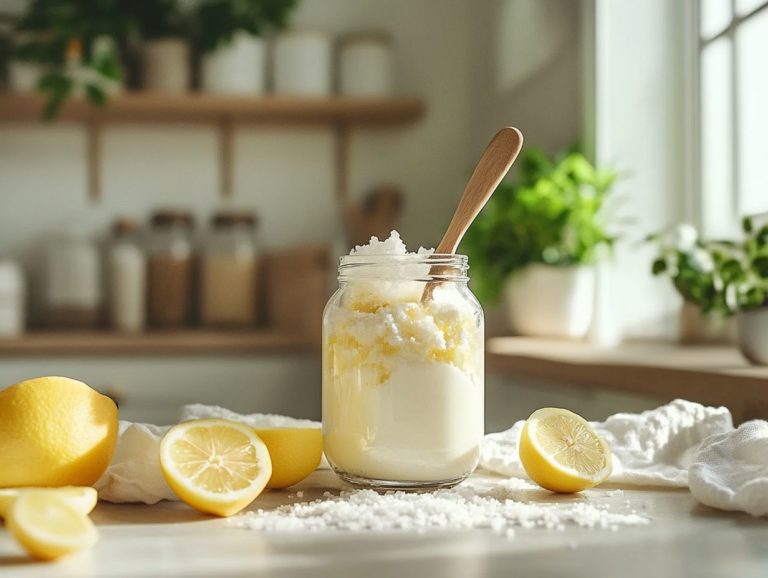3 Simple Recipes for Homemade Floor Cleaners
Maintaining pristine floors can be achieved without resorting to harsh chemicals or splurging on pricey store-bought products, such as commercial floor cleaners. You can explore three straightforward recipes for homemade floor cleaners that cater to all-purpose, hardwood, laminate, and tile surfaces. Get ready to embrace a fresher, healthier home with these simple, eco-friendly alternatives!
You will also learn about safety for pets and children, how often to use these cleaning solutions, and whether they can effectively handle other surfaces like vinyl plank and natural stone. Uncover the advantages of crafting your own cleaners, the uncomplicated ingredients required, and the quick steps to whip them up effortlessly.
Contents
- Key Takeaways:
- 1. All-Purpose Floor Cleaner
- 2. Hardwood Floor Cleaner
- 3. Tile Floor Cleaner
- What Are the Benefits of Making Your Own Floor Cleaners?
- Frequently Asked Questions
- What are the benefits of using homemade floor cleaners?
- What ingredients are commonly used in homemade floor cleaners?
- Can I use homemade floor cleaners on all types of flooring?
- How do I make a simple all-purpose floor cleaner?
- What is the best homemade floor cleaner for hardwood floors?
- Are there any natural disinfectants I can add to my homemade floor cleaner?
Key Takeaways:
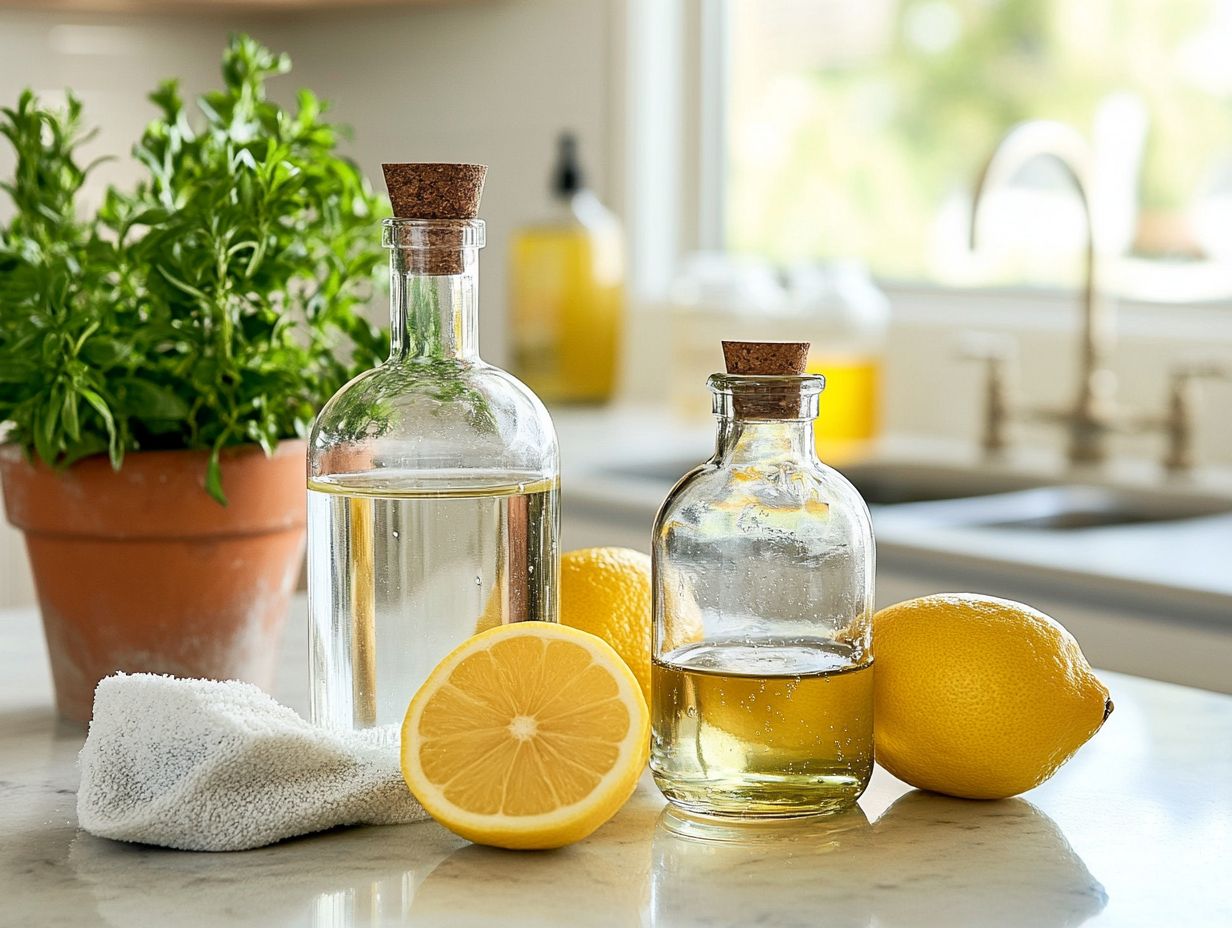
- Save money and reduce exposure to harmful chemicals by making your own floor cleaners at home.
- Simple and easy to make recipes for all-purpose, hardwood, and tile floor cleaners.
- Ingredients used are common household items like distilled vinegar and baking soda, and the cleaners are safe for pets and children.
1. All-Purpose Floor Cleaner
An all-purpose floor cleaner is a must-have in your household, offering a versatile and effective cleaning solution that can handle a range of surfaces, from hardwood and laminate floors to ceramic tile and vinyl floors. With safe ingredients such as distilled white vinegar, liquid dish soap, and essential oils, you can sidestep harsh chemicals and reduce streaking, making your cleaning routine both sustainable and efficient.
This type of cleaner simplifies your cleaning process by eliminating the need for a multitude of products, ensuring that every corner of your home receives the proper care it deserves. For instance, by mixing equal parts of distilled white vinegar and water, you create a powerful yet gentle solution that works wonders on any flooring type. A small squirt of liquid dish soap takes this concoction up a notch, enhancing its grease-cutting power and making it even more effective against stubborn stains.
You can even use a microfiber mop to apply the solution for a streak-free finish. Incorporating essential oils not only infuses your cleaning routine with a delightful aroma but also adds natural antibacterial properties, keeping your living space fresh and safe for your family and pets. Essential oils are natural extracts from plants that provide pleasant scents and have antibacterial properties. Opting for these natural ingredients supports a healthier environment, promoting a lifestyle of conscious living while ensuring your home stays spotless. Homemade floor cleaners are an excellent way to reduce exposure to harmful chemicals.
2. Hardwood Floor Cleaner
Cleaning hardwood floors requires a careful method to preserve their natural beauty and integrity. A homemade hardwood floor cleaner crafted from simple ingredients like distilled white vinegar, rubbing alcohol, and liquid dish soap offers a gentle yet effective solution. This blend not only reduces streaks but also enhances the longevity of your flooring. Using a cleaning solution made from common household items keeps your hardwood floors in pristine condition.
By opting for non-abrasive ingredients, you can lift dirt and grime without jeopardizing the finish of the wood. It s essential to strike the right balance between cleaning power and safety, especially when tending to these delicate surfaces.
To create your own cleaner, grab a spray bottle and mix together the following ingredients:
- 1 cup of distilled white vinegar,
- 1 cup of rubbing alcohol,
- A few drops of liquid dish soap.
Then, add in 2 cups of warm water for optimal results. Give it a gentle shake and spray lightly on the floor before wiping with a microfiber cloth, taking care to avoid oversaturation, as excess moisture can warp the wood. This straightforward yet effective solution not only cleans but also enhances the shine, giving your hardwood floors a fresh look while safeguarding its integrity.
Try these 3 must-try DIY kitchen cleaners today and enjoy sparkling clean floors without the harsh chemicals!
3. Tile Floor Cleaner
For your tile floors, consider crafting a highly effective homemade cleaner using distilled white vinegar and essential oils. This powerful cleaning solution addresses dirt and grime while keeping your tiles gleaming, all without resorting to harsh chemicals. This natural cleaner is suitable for ceramic tiles and can also be used on other surfaces like vinyl plank and laminate floors.
Cleaning tile floors presents unique challenges, especially with stubborn stains in the material between tiles that can get dirty and the relentless dirt buildup common in high-traffic areas. Over time, these issues can rob your tiles of their shine, making them look less inviting. By choosing a natural cleaner, you can effectively battle grime while preserving the integrity of your flooring.
A straightforward recipe is to mix equal parts distilled white vinegar and water, then add a few drops of essential oils, like tea tree or lavender. Not only do these oils enhance the cleaning power, but they also leave behind a refreshing fragrance. This combination offers a safe yet potent solution, ensuring your tiles remain spotless and radiant. For stubborn stains in the material between tiles, you can incorporate a small amount of hydrogen peroxide for additional cleaning strength.
What Are the Benefits of Making Your Own Floor Cleaners?
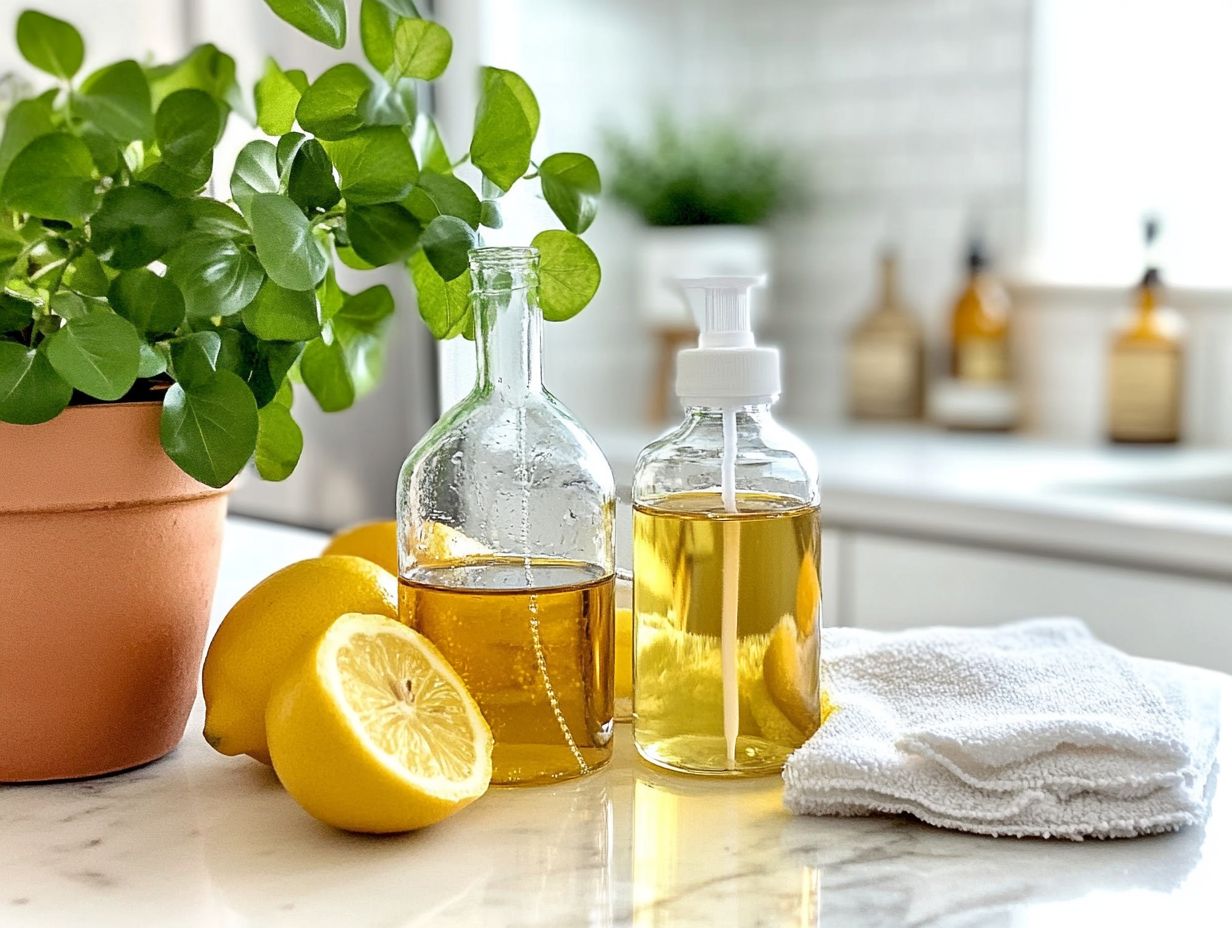
Creating your own floor cleaners offers a variety of benefits:
- You control the ingredients, ensuring they are safe for your family and pets.
- Effectively tackle dirt and grime on various surfaces without relying on harsh chemicals or synthetic fragrances.
- Cost-effective, using ingredients you likely already have at home, such as baking soda and essential oils.
By opting for DIY solutions, you cultivate a healthier living environment while enjoying significant financial savings. Craft your own cleaning products with common household ingredients, allowing for a customized blend tailored to your specific needs whether that s dealing with tough stains or catering to different floor types. Incorporating safe ingredients like distilled vinegar and hydrogen peroxide helps avoid harsh chemicals.
This level of customization leads to impressive cleaning results without annoying side effects, like pesky streaks. Homemade floor cleaners offer effective solutions that keep your house spotless without compromising safety.
By selecting safe, natural components, you can ensure that your cleaning routine is environmentally friendly, helping to reduce harmful waste and contribute to a more sustainable lifestyle. Using natural cleaners made from household items like baking soda and essential oils supports a healthier home environment.
What Are the Ingredients Needed for These Homemade Floor Cleaners?
The ingredients you need to create homemade floor cleaners are remarkably simple and likely reside right in your pantry:
- Distilled white vinegar
- Rubbing alcohol
- Liquid dish soap
- Essential oils
Distilled white vinegar serves as a natural disinfectant, effortlessly breaking down grime and neutralizing odors without harsh chemicals. Rubbing alcohol ensures quick drying and surface sanitization, making it an ideal choice for the hustle and bustle of everyday life. Both ingredients are commonly used in DIY floor cleaner recipes for their effectiveness and safety.
Liquid dish soap works wonders in cutting through grease, ensuring that even the stickiest messes are tackled with ease. And let s not forget about essential oils. They not only add a delightful fragrance to your cleaning routine but also boast antibacterial properties, enhancing your overall cleaning prowess. For tough stains on natural stone surfaces, incorporating a small amount of baking soda can be highly effective.
When you compare these natural ingredients to commercial cleaners packed with toxic substances, it s clear you re opting for a much safer solution for both your family and pets. Plus, they re cost-effective and readily available, making it easy for you to maintain a sustainable cleaning routine. Using a mop bucket for mixing your homemade cleaner further simplifies the process.
How Do You Make These Homemade Floor Cleaners?
Creating your own homemade floor cleaners is remarkably simple. You can mix everyday household items like distilled white vinegar, liquid dish soap, and essential oils in a mop bucket. This means you can craft a powerful cleaning solution tailored to your flooring needs.
With just a few adjustments to the ratios and ingredients, you can develop a range of cleaners perfect for various surfaces whether it’s hardwood, tile, or laminate floors. Begin by identifying the type of floor you’re dealing with, as this will inform your choice of ingredients. For instance, if you have hardwood floors, a mixture of 1 part vinegar to 10 parts water works wonders. Tile floors might require a more concentrated blend, and you can explore 3 ingredients for simple homemade cleaners for effective solutions.
Don t forget to add a few drops of your favorite essential oil, such as lavender or lemon, to infuse your home with a delightful aroma. Using a spray bottle for spot cleaning or a mop for larger areas not only enhances your cleaning routine but also helps maintain a fresh and inviting atmosphere in your home. For added cleaning power, you can also include a small amount of isopropyl alcohol.
Are These Homemade Floor Cleaners Safe for Pets and Children?
Homemade floor cleaners can indeed be safe for your pets and children, especially when crafted with natural ingredients like distilled white vinegar and essential oils. This means you can keep your home sparkling clean without exposing your loved ones to harmful chemicals! Ingredients such as hydrogen peroxide and castile soap also offer effective cleaning without the toxicity.
By choosing these safer alternatives, you significantly reduce the risk of allergies and respiratory issues that can stem from harsh chemical cleaners. Ingredients like baking soda and castile soap provide powerful cleaning without the toxicity associated with conventional options. This makes homemade cleaners an excellent choice for maintaining a healthy, safe environment.
Many store-bought cleaners contain fragrances and dyes that can irritate sensitive noses and skin, particularly in young children and pets. Using natural ingredients ensures that your cleaning routine is free from potentially harmful substances.
Embracing natural ingredients creates a healthier living space for you and your loved ones while bringing peace of mind. You can enjoy your environment, free from worries about chemical exposure, fostering a safe and nurturing atmosphere. A vacuum dust mop can also be used to keep floors clean between deep cleans with your homemade solutions.
How Often Should You Use These Homemade Floor Cleaners?
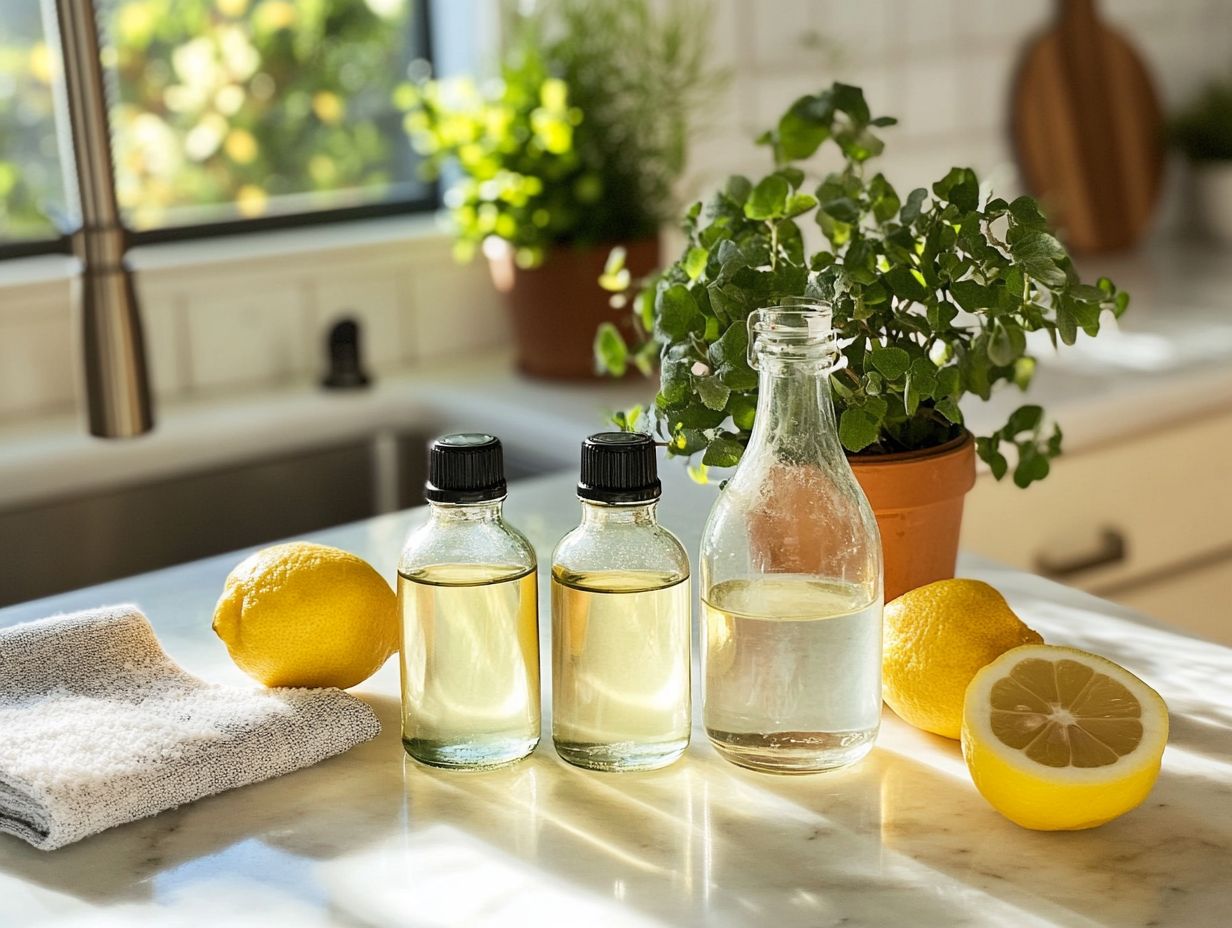
The frequency with which you use homemade floor cleaners hinges on the type of flooring you have and the level of foot traffic it endures. Generally, cleaning hardwood floors, laminate floors, and tile floors every 1-2 weeks with an effective homemade cleaning solution will help maintain their beauty and extend their lifespan. Using a DIY floor cleaner is effective and saves you money.
For example, hardwood floors require a bit more care; opt for gentle cleaners to protect that lovely finish. Tile floors especially in high-traffic areas thrive on more frequent cleaning to fend off grime buildup. Using household items like distilled white vinegar and baking soda can help in maintaining cleanliness. For ceramic tile, a mix of water and hydrogen peroxide can be effective.
Check your floors regularly to keep them looking their best! If you spot any discoloration or notice a dull sheen, it may be time for a deeper clean. To keep things tidy between those thorough sessions, a daily sweep or vacuum dust mop can significantly reduce dirt buildup. Placing mats at entry points is a smart way to trap debris before it settles on your pristine floors. Using a microfiber mop or adding essential oils to your cleaning recipes can help reduce streaks.
Can These Homemade Floor Cleaners Be Used on Other Surfaces?
Absolutely! Homemade floor cleaners work well on many surfaces, including ceramic tile, vinyl floors, and even natural stone. For vinyl plank flooring, these natural cleaners can provide effective cleaning without causing damage. This allows you to maintain a sparkling clean home without cluttering your space with multiple cleaning products.
When using these cleaners, it s crucial to consider the special qualities of each surface. For example, a vinegar-based solution works wonders on ceramic and vinyl. However, it may not be suitable for natural stone due to its acidity, which can etch and damage the surface. Instead, consider a gentle soap and water solution or mixing liquid dish soap with distilled vinegar as a safer alternative for those materials.
For hardwood floors, be mindful of excessive moisture; adapting your homemade cleaner to be more diluted is the way to go.
Always test your cleaner on a hidden spot first to avoid surprises! Make adjustments as necessary for the most effective and safe cleaning experience. Use safe ingredients and avoid harsh chemicals to ensure the longevity of your floors.
Frequently Asked Questions
What are the benefits of using homemade floor cleaners?
Homemade floor cleaners are a great alternative to store-bought cleaners as they are environmentally-friendly, budget-friendly, and are safe for your health and your floors. These cleaning solutions can be made with common household items, making them very accessible.
What ingredients are commonly used in homemade floor cleaners?
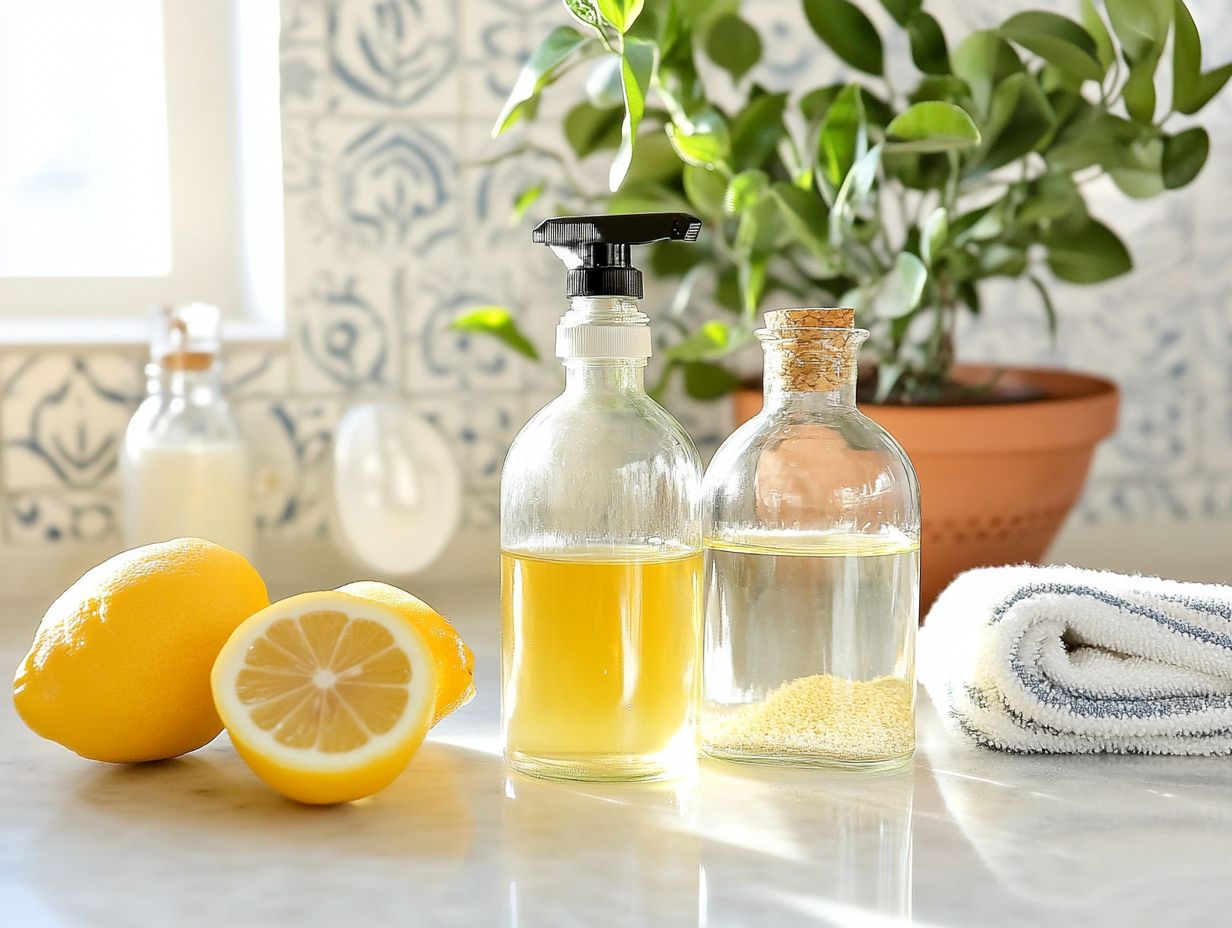
The three most common ingredients used in homemade floor cleaners are vinegar, baking soda, and liquid castile soap. Other popular ingredients include distilled white vinegar, isopropyl alcohol, which is a common cleaning agent that helps remove dirt and germs, and essential oil. These ingredients are affordable and effective in cleaning various types of flooring.
Can I use homemade floor cleaners on all types of flooring?
Yes, most homemade floor cleaner recipes are safe to use on all types of flooring, including hardwood, tile, laminate, vinyl, and even carpet. However, it is always recommended to do a spot test first to ensure compatibility with your specific flooring.
How do I make a simple all-purpose floor cleaner?
To make an all-purpose floor cleaner, mix 1 cup of white vinegar, 1 gallon of hot water, 1 tablespoon of liquid dish soap, and a few drops of your favorite essential oil (optional) in a mop bucket. Use a mop or cloth to clean your floors as usual.
What is the best homemade floor cleaner for hardwood floors?
A simple recipe for cleaning hardwood floors is mixing cup of white vinegar, 1 tablespoon of liquid castile soap, and 2 gallons of warm water in a bucket. You can also add a few drops of essential oils for a pleasant scent. This solution will effectively clean your hardwood floors without damaging the finish.
Are there any natural disinfectants I can add to my homemade floor cleaner?
Yes, you can add a few drops of tea tree oil or lemon essential oil to your homemade floor cleaner for added disinfecting properties. These oils have natural anti-bacterial and anti-fungal properties, making them great for cleaning and disinfecting floors. Adding hydrogen peroxide can also enhance the disinfecting ability without harming the floor.
Try these recipes today and enjoy a cleaner, fresher home!

